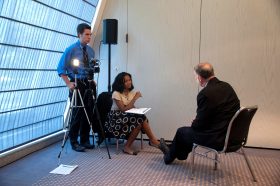Students interviewed Hall of Fame inductees at the Internet Engineering Task Force meeting in Berlin, Germany.

Elon University’s Imagining the Internet Center, the School of Communications and Elon’s Undergraduate Research Program sponsored a documentary journalism team’s interviews in Berlin August 2 and 3 as part of the Internet Hall of Fame Induction weekend.
The team was led by Naeemah Clark, associate professor of communications, and Aaron Moger, a video producer for University Communications. Students on the ethnographic research team included Jeffrey Ackermann, Katherine Blunt, Ryan Greene, Shakori Fletcher and Alex Rose.
The Hall of Fame events, hosted by the Internet Society, took place following the 87th meeting of the Internet Engineering Task Force and just prior to an annual board meeting of the Internet Society.
 The researchers interviewed 24 leaders of Internet evolution past and present, including Richard Stallman, Glenn Ricart, John Perry Barlow, Dave Farber, Steve Goldstein, Kees Neggers, Henning Schulzrinne, Stephen Wolff, Jun Murai, Teus Hagen, Kanchana Kanchanasut, Gihan Dias, Francois Flückiger, George Sadowsky, Tracy Licklider (the son of J.C.R. Licklider), Scott Bradner, Raul Echeberria, Rudi Vansnick, Andrew Sullivan, Bert Wijnen, Jim Galvin, Ralph Droms, Eric Burger and Ram Mohan.
The researchers interviewed 24 leaders of Internet evolution past and present, including Richard Stallman, Glenn Ricart, John Perry Barlow, Dave Farber, Steve Goldstein, Kees Neggers, Henning Schulzrinne, Stephen Wolff, Jun Murai, Teus Hagen, Kanchana Kanchanasut, Gihan Dias, Francois Flückiger, George Sadowsky, Tracy Licklider (the son of J.C.R. Licklider), Scott Bradner, Raul Echeberria, Rudi Vansnick, Andrew Sullivan, Bert Wijnen, Jim Galvin, Ralph Droms, Eric Burger and Ram Mohan.
Interviewees were asked about their roles in Internet leadership and encouraged to share anecdotes and talk about their greatest concerns and hopes for the future evolution of networked communications.
A series of documentary videos featuring the interviews will be posted this fall on the Imagining the Internet site: www.imaginingtheinternet.org.
This global-good Computerworld Honors and Webby Award Honors-winning project asks people to share their views about the Internet – past, present and future – as a public service. Imagining the Internet’s mission is to illuminate the evolution, impact and potential influences of communications networks in order to inform policy development, expose likely futures and provide a historic record.
Elon is the only university in the world that annually funds undergraduate research to document important global discussions of the future of communications. The U.S. Library of Congress is adding this work to its digital archive. Elon students have annually been presenting their Internet research findings at the National Conferences on Undergraduate Research.
These Elon initiatives are planned and managed by Janna Anderson, associate professor of communications and director of the Imagining the Internet Center.


